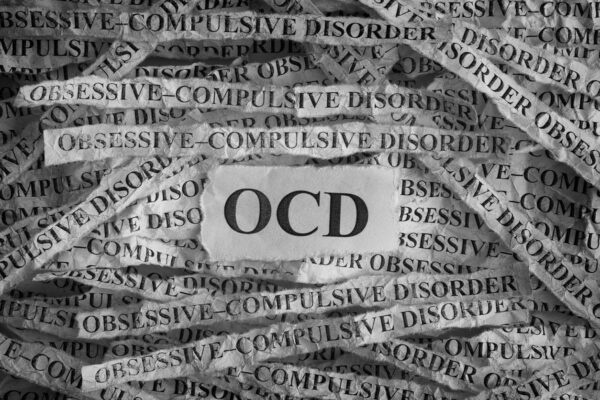
A proven alternative for the treatment of generalized anxiety and major depressive disorder, TMS (Transcranial Magnetic Stimulation) therapy is opening new doors for those suffering from OCD.
In this blog, we’ll explore the symptoms and behaviors associated with OCD and look at how the condition can be treated with TMS therapy: a revolutionary new non-invasive treatment method for certain depressive and anxiety disorders when traditional treatments prove insufficient to provide lasting relief.
What is Obsessive-Compulsive Disorder (OCD)?
Obsessive-Compulsive Disorder (OCD) is an anxiety disorder in which an individual experiences irrational, repetitive, and uncontrollable thoughts, urges, and mental images that are intrusive, unwanted, disruptive, and often highly distressful.
In response to these stress-inducing obsessions, people with OCD feel compelled to perform ritualistic behaviors or compulsions. Compulsions may or may not have a strictly logical or rational connection to an individual’s obsessions but serve to reinforce obsessive thoughts, forming a feedback loop of negative reinforcement.
Many people with OCD feel like they cannot “shut off” their obsessive thinking and compulsive behavior no matter what they do, and it can disrupt their ability to function in their everyday lives. OCD can be very frustrating for the person experiencing it and those who care about them. Many people who struggle with OCD symptoms experience embarrassment and shame that can make it difficult to seek help.
What causes OCD?
While mental health experts don’t yet fully know exactly what causes a person to have OCD, studies suggest that genetics, neurological abnormalities, and one’s environment can influence the likelihood of developing OCD.
Some people carry a genetic risk factor for OCD, while for others, OCD can develop out of stressful or traumatic life events such as abuse, bullying, neglect, loss of a loved one, or childbirth. OCD is also usually comorbid with other mental disorders, such as PTSD, major depression and bipolar disorder, ADHD, and substance disorders.
While OCD can affect some children, the average age of onset of OCD is 19.5 years, and nearly two-thirds of people with OCD see major symptoms before the age of 25. OCD can affect women and men; however, women are three times more likely to be affected than men. According to a 2007 Harvard Medical School study, half of all adults with OCD experience serious impairment due to their symptoms.
What are the main symptoms of OCD?
People who suffer from OCD experience frequent obsessive and unwanted thoughts combined with repetitive, compulsive behaviors such as repetitive thoughts, words, and actions. Obsessive thoughts are usually unwanted and can be negative and repetitive, causing a person to have extreme anxiety and unease.
Many people counter their thoughts with internal thoughts that cause even more anxiety. Outward behaviors can be repetitive and cause a person to struggle to function in everyday life.
Obsessions associated with OCD often have common themes, with some of the most common including fears of contamination, dirt, or germs, obsessions with neatness and order, or aggressive and horrific urges and intrusive thoughts.
Obsessive thoughts can lead to compulsive behaviors such as hoarding, performing elaborate or time-intensive rituals of cleanliness or organization, repeating words, prayers, or phrases, or constantly seeking reassurance from others.
How do you treat OCD?
Like many mental disorders and conditions, including anxiety disorders, depressive disorders, and mental illnesses, the exact mechanisms of OCD are not yet fully understood, and treatment methods can vary widely in efficacy from patient to patient. For many individuals with OCD, psychotherapy such as cognitive behavior therapy (CBT) in conjunction with anti-anxiety medications is sufficient to mitigate the severity of their symptoms and empower them to live comfortably.
However, for some other individuals, a combination of psychotherapy and medication may not be sufficient for treating the symptoms of OCD. When talk therapy and medication aren’t enough, some patients may explore additional alternative options, including:
- Intensive outpatient psychotherapy
- Inpatient, residential treatment programs
- Deep brain stimulation (DBS)
- Transcranial magnetic stimulation (TMS)
The severity and manifestation of OCD vary heavily from person to person, and a treatment that is effective for one patient may have little positive effect for another. One other option for treating severe OCD if therapy and medication prove ineffective is TMS therapy, a non-drug treatment commonly used for depression that involves the use of focused magnetic pulses to stimulate the brain.
How does TMS work to treat OCD?
An innovative approach to treating anxiety and depressive disorders, TMS works to treat OCD in a non-invasive way by using magnetic pulses targeted to certain areas of the brain responsible for obsessive thinking and behavior. These magnetic pulses encourage neuroplasticity, the ability of the brain to adapt and change its neural connections, to train it to better regulate the part of the brain responsible for obsessive thoughts.
TMS therapy was originally developed as a method to reduce or even eliminate symptoms of major depression for a period of six months to a year when other treatment methods proved ineffective or insufficient.
TMS therapy is an outpatient therapy consisting of daily sessions, typically no longer than twenty minutes, that typically cause little to no discomfort and have no systemic side effects. Many patients see long-term improvement after four to six weeks of treatment.
Over the years, TMS has also been investigated for other depressive and anxiety disorders. After much success treating several other mental health disorders, TMS was approved by the FDA as an alternative treatment for OCD earlier this year.
TMS of Central Florida is the only provider of NeuroStar TMS therapy for OCD in Brandon, Florida.
Learn More About TMS Treatment for OCD
Who is a candidate for TMS?
The common methods of treating OCD include cognitive behavioral therapy and mindfulness meditation, along with anti-anxiety medications such as SSRIs, which alter your brain chemistry to correct the chemical imbalances that lead to OCD symptoms. For OCD patients who experience adverse side effects from SSRIs or cannot safely take SSRIs due to complicating factors such as other medical conditions, TMS may be an option.
You may be a candidate for TMS if you:
- Have been diagnosed with OCD
- Have exhausted all other possible treatment options
- Meet the physical criteria to be a TMS candidate
How do you get started with TMS for OCD?
Severe cases of OCD can be debilitating. At TMS of Central Florida, we specialize in helping individuals find an alternative way to treat OCD resistant to other traditional therapy methods. If you’re suffering from OCD, TMS may be right for you.
Contact us today by email or call 813-423-7037 for a free consultation to see if TMS may be an OCD treatment that might work for you.

